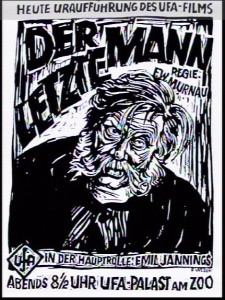I got a lot of good news today, and much celebration followed. I went out for a big, nice meal with my parents and Anthony. I watched this movie before we left, so I'm going to try to post before I fall into a food coma.
The film, directed by F. W. Murnau in 1924, is a really interesting and great silent film. I wasn't really in the mood for a silent film at first. I was antsy and unfocused, and I wondered if that is how everyone else I know feels when they try to watch a silent movie. Once it got going and I settled in the plot, I was totally hooked. I loved this movie. It is really different from other silent films I've seen, and although it was a first at little sad, it didn't dampen my excited mood at all. I never would have found this movie on my own, so I'm really happy I was able to watch it for my project. The poster for this looks scary. It is not a scary film,. I promise.
The movie is about a doorman at a famous hotel that many wealthy people go to. He is really proud of his job and of his fancy uniform. However, he is demoted to a washroom assistant, because he is too old and crazy looking. He tries to hide that he was demoted, but the truth comes out. All of his friends think that he was lying all along, and they mock him cruelly. Spoiler alert - the film almost ends with him sitting in a bathroom, miserable and depressed, but a title card (the only title card) comes on the screen. It explains that in real life, the movie would end here, but the writer took pity on the man and wrote him an "improbably epilogue". In the epilogue, a wealthy man leaves all of his fortune to the doorman, who then feasts lavishly in the hotel he once worked in.
It's a satisfying plot, for me at least. I think normally I would have been annoyed by a stereotypical "happy ending" sort of thing, but today, in a good mood, I liked it. At first the film felt too depressing, and I was annoyed I had to watch something so sad when I wanted to be out celebrating. I was happy that I could remain in a good mood from the uplifting ending. I get that it's not realistic, and I usually really hate stuff like that. I guess it's a sign of how good my mood is today, hrm? Ebert doesn't like the happy ending, but I don't really mind. My favorite movies are ungodly depressing, like The Seventh Continent. I think I'm allowed to like one contrived happy ending. Just one.
I never saw a silent film without title cards before. Usually they are easy enough to follow, but the text helps to bridge some of the gaps that the acting might leave. Here, there is no such thing. There is only one title card, the one I mentioned in the summary. You have to get all the information from the acting and the expressions of the actors. I thought this was really unique, and I liked having to rely on the acting to get the whole plot. It's so rare now that we have to actually focus on a performance to understand what is going on. We usually just blatantly see or hear the information we need to get. It's, I don't know, fun, I guess, to have to work a little harder to watch a movie.
There are other important parts of the movie, such as the use of a moving camera. Ebert writes about it better than I can, saying, "Here he liberated the camera from gravity. There is a shot where the camera seems to float through the air, and it literally does; Freund had himself and the camera mounted on a swing, and Abel Gance borrowed the technique a few years later for his "Napoleon." There are shots where superimposed images swim through the air, the famous shot that seems to move through the glass window, and a moment when the towering Hotel Atlantic seems to lean over to crush the staggering doorman" (Great Movies II, 235). This is stuff that was never done before! It seems stupid to be like, "movement, WOW!" but that was something new to cinema. Cameras didn't move through objects, or float around down hallways. They stayed in one place. It's really interesting to be able to watch a movie that has so much new technique, even if it doesn't seem new anymore.
I really liked this movie, but as you know, I like silent movies a lot. I don't mind films that you have to work with and really focus on to understand. So, just my opinion, I guess. The happy ending is random and not for everyone, but I liked it in my disturbingly cheerful mood. I am exhausted from too much food and wine and even some shopping, so I'm going to slouch down on my couch and relax. Let me know if you check this movie out - it's on Netflix instant right now!
Links:
Ebert's Great Movie Essay on The Last Laugh
Buy or rent it on Amazon

No comments:
Post a Comment